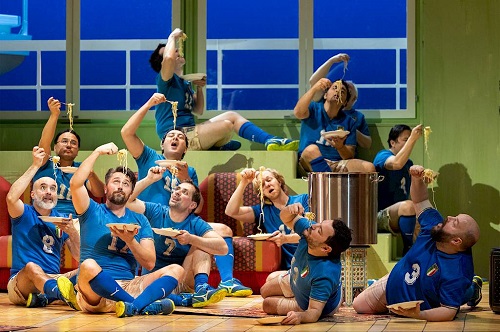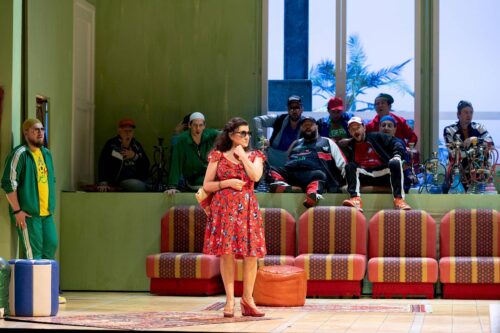 Switzerland Rossini, The Italian Girl in Algiers: Soloists, Chorus of the Zurich Opera, Orchestra la Scintilla / Gianluca Capuano (conductor). Zurich Opera, Zurich, 6.3.2022. (JR)
Switzerland Rossini, The Italian Girl in Algiers: Soloists, Chorus of the Zurich Opera, Orchestra la Scintilla / Gianluca Capuano (conductor). Zurich Opera, Zurich, 6.3.2022. (JR)

Production:
Directors – Moshe Leiser, Patrice Caurier
Set – Christian Fenouillat
Costumes – Auguste Cavalca
Lighting – Christophe Forey
Video – Étienne Guiol
Chorus – Ernst Raffelsberger
Dramaturgy –Christian Arseni, Kathrin Brunner
Cast:
Isabella – Cecilia Bartoli
Mustafà – Ildar Abdrazakov
Lindoro – Lawrence Brownlee
Taddeo – Nicola Alaimo
Haly – Ilya Altukhov
Elvira – Rebeca Olvera
Zulma – Siena Licht Miller
Stendhal described this opera as ‘organised and complete madness’ and he wasn’t far wrong. The plot is simple and inconsequential: Mustafà, the Algerian Sultan, is no longer attracted to any of his harem’s concubines, particularly not to his wife Elvira, and orders his assistant, Haly, to find an Italian girl, as he has heard that Italian women have particularly seductive charms. A shipwreck duly delivers the required goods in the shape of Isabella. Isabella is however searching for her lover Lindoro, who, as luck would have it, turns out to be Mustafà’s favourite slave. Isabella is captured, along with her current boyfriend, Taddeo, who poses as her uncle rather than be impaled as a rival lover. The rest is pure bedroom farce, with – of course – a happy ending.
This Moshe Leiser/Patrice Caurier production stems from pre-pandemic Salzburg. It cleverly updates the setting into current-day Algiers (Mustafà is not a Sultan but a dodgy dealer in stolen goods down by the docks and manager of the local football team) and turns the action into a turbulent multiculti comedy. Before the overture begins, we hear the raucous squawking of seagulls and the call of the Muezzin – and we know we are in downtown Algiers. Rossini colours his effervescent overture with percussion (including a tower of miniature bells) to add Arabic flavour. The curtain rises to show the Sultan in bed with his wife; he is impervious to her continual sexual advances. A picture of camels on the wall behind their bed turns into a witty cartoon of the camels chasing each other with clear procreative intent. The jokes follow with hardly a break: Lindoro, the Sultan’s slave, enters with vacuum cleaner; modern-day Algiers is complete with carpet salesmen, satellite dishes, washing hangs from dilapidated balconies, Mustafà enters in a rusty old car. Isabella enters on a model of a camel, the stage lowered to allow her to descend gracefully (later the camel breaks wind visibly). There are too many comic touches to mention – but they all succeed. Right at the end of the opera, Lindoro returns to Italy with Isabella on a ship, and an overhead seagull poops on the poor, spurned, painfully sunburnt Taddeo.

The cast is almost identical to that in Salzburg. We have to begin with Cecilia Bartoli. Her voice is predestined for Rossini roles. Whilst her voice may no longer be at its absolute peak, her lower and mid registers are still most impressive and Bartoli can dispatch the most intricate of trills and coloratura with ease. She is also a consummate actress, a skill she needs to employ in this opera to the full. One has to say that one’s credulity is a little stretched when the tall, virile, handsome (even with added padding) Russian bass Ildar Abdrazakov is more attracted to Bartoli rather than the younger and sprightly Mexican soprano Rebeca Olvera’s Elvira, even though make-up worked hard to make her as dowdy and unattractive as possible. (Incidentally, in real life, Abdrazakov was once married to Russian mezzo Olga Borodina.)
Abdrazakov has a warm sheen to his bass and is a natural comedic talent. He may not have the most resonant low notes but stamina in reserve for the long outbursts of ‘Pappataci!’ in the second act.
Lawrence Brownlee is, no doubt, one of the leading light lyrical tenors of the day, and his arias were always a delight. His top notes way above top C hit the spot, and did not sound too strangulated.
I really liked Nicola Alaimo’s creamy baritone, though his girth (no added padding required) made one wonder why Isabella should prefer him to the Sultan. Ilya Altukhov, as Haly, was a mite underpowered, virtually inaudible when singing in quartets and septets. However, his aria singing the praises of Italian women was very well delivered, even though one was mightily distracted by the La Dolce Vita images of Swedish actress Anita Ekberg, at first with a white kitten on her head, descending into the waters of the Trevi Fountain, watched by Marcello Mastroianni.
Rebeca Olvera’s bright, sparkling soprano is always a delight, especially when being whizzed around on a remote control armchair. The supporting role of Zulma was well taken by Siena Licht Miller.
The male chorus had about eight quick costume changes (I may have missed some) including ladies of the harem, first in burkas then as belly dancers; local football fans; carpet salesmen; Italian football fans and finally as assistant ‘Pappataci’. They sang well even when their mouths were stuffed with spaghetti.
The orchestra fizzed along, aided by an energetic Gianluca Capuano in the pit who kept up the helter-skelter pace.
There are nine more performances through to April 5th, the last three will not feature La Bartoli but Russian mezzo Nadezhda Karyazina in the main role. Pietro Spagnoli takes over from Abdrazakov for the last five performances. With distressing events unfolding in Ukraine, this opera buffa can certainly provide some distracting relief.
John Rhodes
